
Oil and gas extraction (OGE) workplaces present distinctive safety and health challenges that have received limited attention from public health and occupational health experts. OGE employees encounter significantly higher rates of fatal work-related injuries, historically seven times greater than the average for all U.S. workers. Their jobs involve physical demands, exposure to dangerous chemicals and flammable, toxic gasses, lengthy commutes, shift work, and outdoor work in various environmental conditions.
Oil field truck accidents can have devastating consequences due to the high-risk nature of the industry. These accidents often result in severe injuries, including burns, fractures, traumatic brain injuries, and even fatalities. The combination of heavy machinery, volatile materials, and challenging working conditions makes oilfields prone to accidents. Hiring a Houston oilfield accident lawyer is crucial to recover compensation after oil field tanker truck accidents. To get started, contact us today.
Why Do Oilfield Truck Accidents Happen so Frequently?
The unique challenges posed by the oil and gas industry, coupled with the rugged terrain of oilfield roads and the heavy machinery involved, create a hazardous environment where accidents can have severe consequences. Understanding these causes is crucial for implementing effective safety measures.
Researchers from the Centers for Disease Control and Prevention (CDC) examined 470 fatalities among U.S. industry workers. They identified that the primary causes of death were vehicle accidents and being struck by objects while working. Additional contributing factors included explosions, falls, and exposure to hazardous substances.
Employer Factors in Oilfield Tanker Truck Accidents
The oil and gas industry is known for its demanding schedules and tight deadlines. Truck drivers transporting equipment, chemicals, or materials to and from oilfields may face pressure to meet delivery timelines, potentially leading to reckless driving behaviors. Further, long hours and irregular schedules can lead to driver fatigue. Fatigued truck drivers are more likely to make errors, experience slower reaction times, and fall asleep at the wheel, increasing the risk of accidents.
Some oilfield truck drivers may not receive proper training or may lack experience handling the specialized equipment they transport. Inadequate training can result in accidents when drivers are unfamiliar with safety procedures or the unique challenges of oilfield roads.
Environmental Causes Impacting Oil Field Truck Crashes
Oilfield roads are often unpaved or poorly maintained due to heavy industrial traffic. These rugged conditions can make it challenging to control a truck, increasing the likelihood of accidents, especially in adverse weather. Moreover, mechanical failures in trucks or the equipment being transported can lead to accidents. This could include brake failures, tire blowouts, or issues with the cargo securing mechanisms. Additionally, Texas can experience extreme weather conditions, including heavy rain, fog, and high winds, making driving hazardous. Poor visibility and slippery roads due to rain can contribute to accidents.
Oilfield Truck Driver Negligence
Some drivers may engage in speeding or reckless behaviors to save time or meet tight schedules. This can result in loss of control and collisions with other vehicles or objects. Distractions such as using mobile phones, eating, or multitasking while driving can divert a driver’s attention from the road, increasing the risk of accidents. The use of drugs or alcohol by truck drivers, whether on or off duty, can impair judgment and motor skills, making accidents more likely.
Given the complex interplay of these factors, addressing oilfield truck accidents in Texas requires a multifaceted approach. This includes stricter regulations, improved training, better maintenance of oilfield roads, and increased awareness of the dangers associated with the industry. Additionally, promoting a culture of safety and responsible driving among truck drivers and companies is essential to reduce the occurrence of these accidents.
What Can Be Done to Avoid Oil Field Tanker Truck Accidents?
Avoiding oilfield truck accidents in Texas requires a comprehensive approach that addresses the various factors contributing to these incidents. Employers in the Texas oil and gas industry play a critical role in preventing truck accidents and ensuring the safety of their workforce.
Training
Employers should develop and implement thorough training programs for truck drivers. These programs should cover safety protocols, defensive driving techniques, and awareness of the unique challenges associated with oilfield roads. Regularly update training materials to reflect current industry standards.
Moreover, employers should implement a system for monitoring compliance with hours of service (HOS) regulations to prevent driver fatigue. Employers must encourage drivers to take necessary rest breaks and adhere to HOS limits.
Hiring Practices
Employers should establish stringent hiring and qualification standards for truck drivers. Conduct thorough background checks, assess driving records, and verify qualifications to ensure that only competent and responsible individuals are hired.
Moreover, oilfield truck drivers should avoid drug and alcohol use, both on and off duty. Employers should consider regular testing to enforce compliance. Employers must offer ongoing training and educational programs to update drivers on the latest safety practices and regulations.
Vehicle Maintenance
Similarly, oil field employers should enforce regular maintenance schedules for vehicles and equipment and conduct thorough inspections to identify and address potential issues that could lead to accidents, such as brake failures or tire problems.
Technology
Investing in advanced safety technologies for vehicles, such as collision avoidance systems and lane departure warnings, can provide critical warnings and assist drivers in avoiding accidents. Similarly, employers should develop and communicate emergency response plans to drivers.
Weather
Both employers and drivers should continuously monitor weather conditions, especially in Texas, where weather can be unpredictable. Equip drivers with proper gear and training to handle adverse weather.
By taking these measures, employers can significantly reduce the risk of oilfield truck accidents in Texas, protect their employees, and enhance the overall safety and reputation of their operations in the oil and gas industry.
Have You Been Hurt in an Oilfield Truck Accident?
If you or someone you love was recently seriously injured in an accident with an oilfield truck, the dedicated Houston injury lawyers at Armstrong Lee & Baker, LLP can help. Our Houston truck accident lawyers have decades of experience helping injured motorists recover fair compensation for what they’ve been through. We firmly believe that there is no substitute for hard work, and we are uniquely dedicated to ensuring each of our clients receives the best possible result. To learn more and to schedule a free consultation, call Armstrong Lee & Baker, LLP today. You can also connect with our injury lawyers by completing our secure online contact form.
